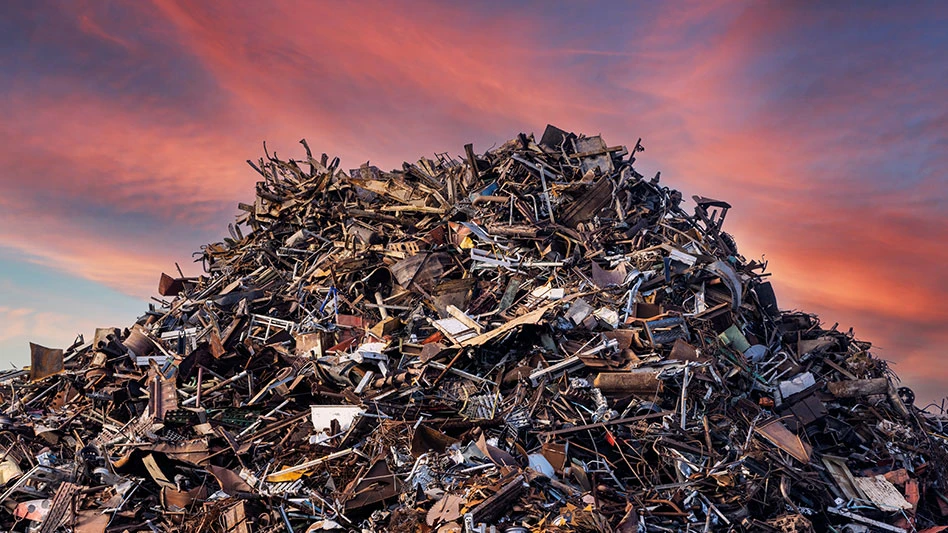201 IS DEEP-SIXED
The Bush Administration has ended the Section 201 steel tariffs 16 months earlier than planned, primarily to avert a looming trade war with the European Union and other nations.
In public statements, the administration said the tariffs had accomplished their goal. "These safeguard measures have now achieved their purpose, and as a result of changed economic circumstances, it is time to lift them," a presidental spokesman said.
The president also vowed that his administration would operate a tracking system to monitor steel imports "so that my administration can quickly respond to future import surges that could unfairly damage the industry."
Rulings and strong comments against the tariffs by the World Trade Organization preceded the December announcement . Additionally, the EU and other nations had begun threatening billions of dollars in retaliatory sanctions against the U.S. that included tarrifs on citrus fruit from Florida, textiles and farm machinery.
While most domestic steel-makers favored the measures, opponents had included not only other steel producing nations, but also U.S. steel consumers.
The Reuters news service speculates that ending the tariffs 16 months ahead of schedule could spark a political backlash against Bush in the 2004 election in key steel-producing states such as Ohio, Pennsylvania and West Virginia.
CHINA ROLLS ALONG
China’s industrial output grew 17.9 percent in November compared with figures for November of 2002, according to that nation’s National Bureau of Statistics.
In a statement summarized by the China News Daily of Beijing, the iron and steel industry was cited as one of four key factors in the booming growth rate.
The industrial output grew a year-on-year 17.2 percent in October and 16.3 percent in September. Only February, with its 19.9 percent jump, showed a bigger increase.
Electronics and telecommunications equipment; transportation equipment; machinery equipment; and ferrous metals were cited as "the major contributors to the month’s industrial growth," by bureau spokesman Yao Jingyuan. "The four sectors contributed 46.9 percent of November’s industrial growth," he told the China News Daily.
For the first 11 months of 2003, China’s industrial output grew a year-on-year 16.8 percent to $440 billion.
Steel and other metals should remain in demand, as the output of cars surged 71.6 percent to 200,200 vehicles in November from the 2002 figure. Computer production also rose 130 percent, according to the bureau.
"Production will continue to grow at a higher rate in the coming months and next year," predicted Wang Zhao, a researcher with the State Council’s Development Research Centre.
The industrial growth has been part of an overall wider economic growth. "If there are no major unexpected fluctuations, the country’s economy is expected to grow 8.5 percent for 2003," Qiu Xiaohua, deputy commissioner of the National Bureau of Statistics, told the Beijing newspaper.
Multi-national manufacturers continue to follow the boom, as German-U.S. auto giant DaimlerChrysler in early December announced plans to form a joint venture with Fujian Motor Industry Corp. of China and China Motor Corp. of Taiwan in mid-2004 to produce its Mercedes-Benz vans on the mainland.
The three companies will invest $245 million into the joint venture, which will be located in Fuzhou, in east China’s Fujian Province.
Equity Firm Buys Tube City
A private equity firm based in Cleveland has purchased a majority interest in scrap processing and steel mill services company Tube City LLC, King of Prussia, Pa.
Blue Point Capital Partners, with offices in Cleveland, Seattle and Charlotte, N.C., used its own equity as well as funding provided by Tube City management and funds borrowed from four banks to make the purchase.
"Tube City has grown due to its strong focus on the customer," Blue Point principal Chip Chaikin remarks. "Tube City’s expertise enables the company to perform a wide variety of functions outsourced by their customers, saving them money and time. We are excited to partner with Tube City’s impressive management team and look forward to expanding this strong platform into both enhanced services and new geographies."
Tube City provides scrap management, slag processing and metal recovery services to integrated steel mills, mini-mills and foundries throughout North America and to U.S. Steel Co. mills in Eastern Europe. In a March 2002 Recycling Today effort to find the 20 largest ferrous scrap processors in the U.S., Tube City ranked third.
Blue Point bills itself as a large private equity firm focusing on investments in manufacturing, distribution and service businesses addressesing industrial and consumer markets. Tube City is the 13th investment in Blue Point’s portfolio.
Get curated news on YOUR industry.
Enter your email to receive our newsletters.
Explore the January 2004 Issue
Check out more from this issue and find your next story to read.
Latest from Recycling Today
- Altilium produces EV battery cells using recycled materials
- Brightmark enters subsidiaries of Indiana recycling facility into Chapter 11
- Freepoint Eco-Systems receives $50M loan for plastics recycling facility
- PET thermoform recycling the focus of new NAPCOR white paper
- Steel Dynamics cites favorable conditions in Q1
- Hydro starts up construction in Spain
- Green Cubes unveils forklift battery line
- Rebar association points to trade turmoil






